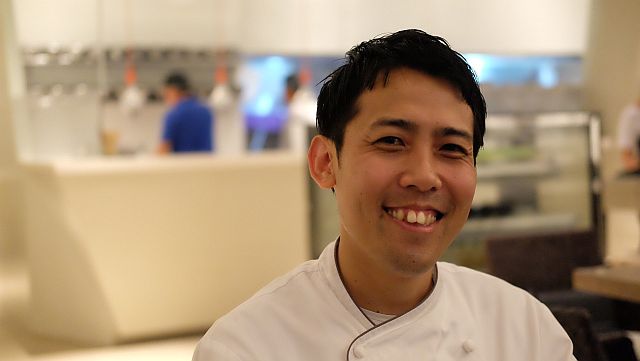
CHEF HIROFUMI IMAMURA, the 38-year-old Chef de Cuisine of Kappou Imamura
There are 42 minutes and 10 seconds of Hirofumi Imamura’s voice on my recorder, which is surprising, even as we have been bracing for a temperamental artist who may or may not even speak to us.
“I’ve had one chef who didn’t talk to me for three months,” recalls Tiger Resort President Steve Wolstenholme, the mother company of Okada Manila, sidling next to me after flirting — quite successfully — with the entire room. The strapping gentleman knows people and service well, having manned casinos in the heart of the business, Las Vegas herself. And yet the one he has brought to us is anything but tight-lipped about his craft.
“When you have dinner with us at the restaurant,” shares Chef Imamura, ”I want you to wake up the next day hungry. This is what I want to happen.”
As a business model, it is brilliant. Keep the customer full enough to be happy for that meal, but hungry for more. As a personal philosophy, it is so brazenly simple you’d mistake it for the inane, if you take it out of the context of the whole of his beliefs, which are nothing less than genius.
THE PLUM in this one was my favorite, reminding me of my penchant for Chinese kiamoy: truffle and buttered rice with miso soup, paired with a Resalte Gran Reserva 2009.
The Michelin-starred Chef de Cuisine of his namesake Kappou Imamura, just one of 21 restaurants in the 45-hectare property, believes in a tight philosophy of fives. “All of my food uses the five essential colors: green, white, black, yellow and red. There is balance when you have all these.”
The dinner tonight at Anzani Prime, which features a tasting menu that is restrained and generous at the same time, also features another aspect of his Philosophy of 5: “We also used all five techniques in cooking for this evening’s dishes: raw (a flash smoked fish salad, called such because it is exposed to smoke only upon serving, to lend but a hint); deep-fried (not quite deep, but a delicious truffle fried rice bowl that went with a deconstructed miso soup, grilled (the Chairman’s favorite: charcoal-grilled kinki fish done yaki-nikute style); and steamed (a sake simmered lobster in a winter sauce and my personal favorite: stewed wagyu beef and Yuba soy skin).
It was, quite honestly, a repertoire of traditional Japanese food unlike the ones the world is already familiar with. For one, there were no sauces on the table. “When I say traditional, we mean mostly the food from Kyoto,” says Chef Imamura. “As for the sauces, we do it Ginza-style, where we can adjust to the taste of the customer, bringing him soy sauce if he needs it, but only if he asks for it.”
He is quick to mention luck when we refer to his accolades. At 38, he has already lived all over the world, buoyed by the passion of a billionaire, who he is lucky to have as a father figure. “Mr. Okada wanted me to grow and grow,” he shares simply. “I have been very lucky.”
It is an understatement of course, and an effective redirection from his hard work, and a relentless seven days a week grind that often starts at 7 a.m. and ends well into the evening, even as he is compensated “way too too expensive.”
YUZU GIANDUJA with bitter chocolate mousse and mango sorbet. And gold leaf, too! The Japanese citrus yuzu was the perfect counterfoil of the gianduja, which is a chocolate spread made mostly of hazelnut paste.
But he is, in fact, truly luck to have the backing of a man whose billions were made primarily on the manufacture of the Pachinko machine, a Japanese version of a slot machine, and ubiquitous around the country. “I am lucky to have access to the best ingredients,” Imamura tells us. “A good chef may have Tokyo’s markets at his disposal, but the Chairman allows me to buy from all the markets in Japan and have them shipped here.” Authenticity, at least in this singular important aspect, is a foregone conclusion.
Tonight, we dine like billionaires, with food served at Kazuo Okada’s table. With an attention to detail that is absolute.
WAGYU BEEF with arrowhead, spinach, napa and carrots in an egg foam that is done traditionally. Chef Imamura insists that when you eat his carrots, they should taste like carrots, radishes should taste like radishes, and turnips, turnips. Vegetables are his favorite thing to work with.
“We change the presentation of your food based on whether you are a leftie or a rightie,” shares Imamura, “this is why I have an open kitchen, so we can observe as you come in.” Apparently, there is an optimal way to serve food based on your dominant hand.
“And yes, we think of the ladies, too.” Here, he smiles and tells us the story of his serving sizes, which are all made in 4 centimeter diameter. “The average mouth opens at this size, so one does not have to stretch the mouth too wide for our bite-size servings.”
So we swig excellent wine like moneyed men for this taste of Okada, and pat our unstretched mouths daintily like proper Japanese women. Ah, they do think of everything.